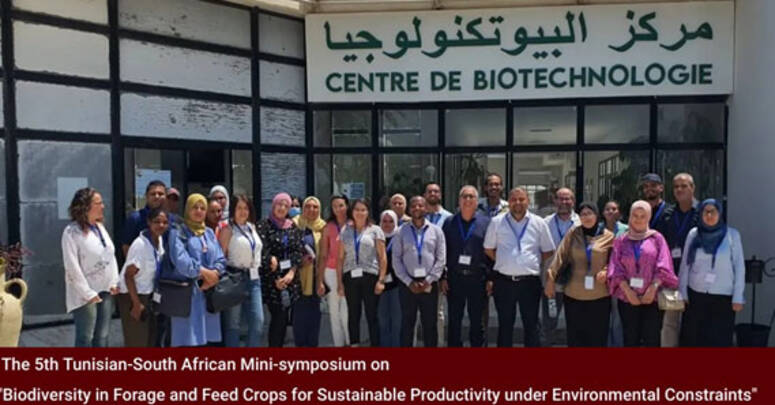the 5th Tunisian-South African Mini-symposium on « Biodiversity in Forage and Feed Crops for Sustainable Productivity under Environmental Constraints »

World population growth is increasing while crop yield crops is increasingly negatively affected by environmental constraints. In their natural habitat, plants are constantly subjected to several biotic and abiotic stresses that drastically reduce their productivity. Among these constraints, drought, salinity and fungal attack, often combined, represent the main factors limiting the productivity of main crops of economic interest in the world and in Africa. These environmental constraints have been exacerbated in recent decades by the effects of climate change.
Alfalfa, known in Tunisia and South Africa as lucerne, is the most widely cultivated forage legume and is regarded as the most desirable crop for this purpose because of its good nutrient profile for livestock and its ability to enrich soil through biological nitrogen fixation. Despite these desirable characteristics, alfalfa is mainly grown under irrigation. Apart from the impact of irrigation on limited water resources which may be from saline environments, increased incidence of droughts in semi-arid and arid environments in Tunisia and South Africa (both are water-scarce countries) has severe impact on alfalfa yield.
Compounding the challenges presented by drought and salinity is the occurrence of plant pathogenic microorganisms that cause disease to plants. An important pathogen of alfalfa is Phoma medicaginis. This fungal pathogen causes spring black stem and leaf spot disease in alfalfa, which is one of the most devastating diseases of alfalfa.
Aiming at improving the productivity of alfalfa under combined stresses in both countries, the Centre of Biotechnology of Borj Cedria (CBBC) in Tunisia and the Plant Stress Group at the University of the Western Cape (UWC) in South Africa in collaboration with the Tunisian seed company COTUGRAIN Impex and the South African National Lucerne Trust (NLT), are collaborating in the framework of the Tunisian-South African project (2019-2023) entitled "Characterization of alfalfa accessions towards efficient breeding for drought, salinity and Phoma medicaginis disease resistance". To do this, an integrated approach using plant genetics and genomics and a consortium of endophytic bacteria was adopted. This project is coordinated by Prof. Mounawer Badri and Prof. Ndiko Ludidi from Tunisian and South African sides, respectively.
In the framework of this project, the Laboratory of Extremophile Plants (LPE) in CBBC and the Plant Stress Group in UWC in collaboration with the Tunisian Association of Genetic Resources (TAGR) organized the 5th Tunisian-South African Mini-symposium on " Biodiversity in Forage and Feed Crops for Sustainable Productivity under Environmental Constraints " which was held on July 21st, 2022 at the CBBC. A total of 40 attendees from the academic sector from four countries including South Africa, Algeria, Turkey and Tunisia as well as members of non-governmental organizations (NGOS), and socio-economic partners participated in the Tunisian-South African Mini-symposium. In the Mini-symposium, 15 plenary presentations by eminent experts, 6 oral presentations and 10 posters were presented. These presentations revolve around 3 themes: (i) Diversity of responses to abiotic and biotic stresses in fodder and feed crops, (ii) Identification and characterization of genetic determinants for tolerance to environmental constraints, and (iii) utilization of culture practices and biofertilizers for plant improvement under abiotic and biotic stresses.
Alfalfa, known in Tunisia and South Africa as lucerne, is the most widely cultivated forage legume and is regarded as the most desirable crop for this purpose because of its good nutrient profile for livestock and its ability to enrich soil through biological nitrogen fixation. Despite these desirable characteristics, alfalfa is mainly grown under irrigation. Apart from the impact of irrigation on limited water resources which may be from saline environments, increased incidence of droughts in semi-arid and arid environments in Tunisia and South Africa (both are water-scarce countries) has severe impact on alfalfa yield.
Compounding the challenges presented by drought and salinity is the occurrence of plant pathogenic microorganisms that cause disease to plants. An important pathogen of alfalfa is Phoma medicaginis. This fungal pathogen causes spring black stem and leaf spot disease in alfalfa, which is one of the most devastating diseases of alfalfa.
Aiming at improving the productivity of alfalfa under combined stresses in both countries, the Centre of Biotechnology of Borj Cedria (CBBC) in Tunisia and the Plant Stress Group at the University of the Western Cape (UWC) in South Africa in collaboration with the Tunisian seed company COTUGRAIN Impex and the South African National Lucerne Trust (NLT), are collaborating in the framework of the Tunisian-South African project (2019-2023) entitled "Characterization of alfalfa accessions towards efficient breeding for drought, salinity and Phoma medicaginis disease resistance". To do this, an integrated approach using plant genetics and genomics and a consortium of endophytic bacteria was adopted. This project is coordinated by Prof. Mounawer Badri and Prof. Ndiko Ludidi from Tunisian and South African sides, respectively.
In the framework of this project, the Laboratory of Extremophile Plants (LPE) in CBBC and the Plant Stress Group in UWC in collaboration with the Tunisian Association of Genetic Resources (TAGR) organized the 5th Tunisian-South African Mini-symposium on " Biodiversity in Forage and Feed Crops for Sustainable Productivity under Environmental Constraints " which was held on July 21st, 2022 at the CBBC. A total of 40 attendees from the academic sector from four countries including South Africa, Algeria, Turkey and Tunisia as well as members of non-governmental organizations (NGOS), and socio-economic partners participated in the Tunisian-South African Mini-symposium. In the Mini-symposium, 15 plenary presentations by eminent experts, 6 oral presentations and 10 posters were presented. These presentations revolve around 3 themes: (i) Diversity of responses to abiotic and biotic stresses in fodder and feed crops, (ii) Identification and characterization of genetic determinants for tolerance to environmental constraints, and (iii) utilization of culture practices and biofertilizers for plant improvement under abiotic and biotic stresses.



























Comments
0 de 0 commentaires pour l'article 254587